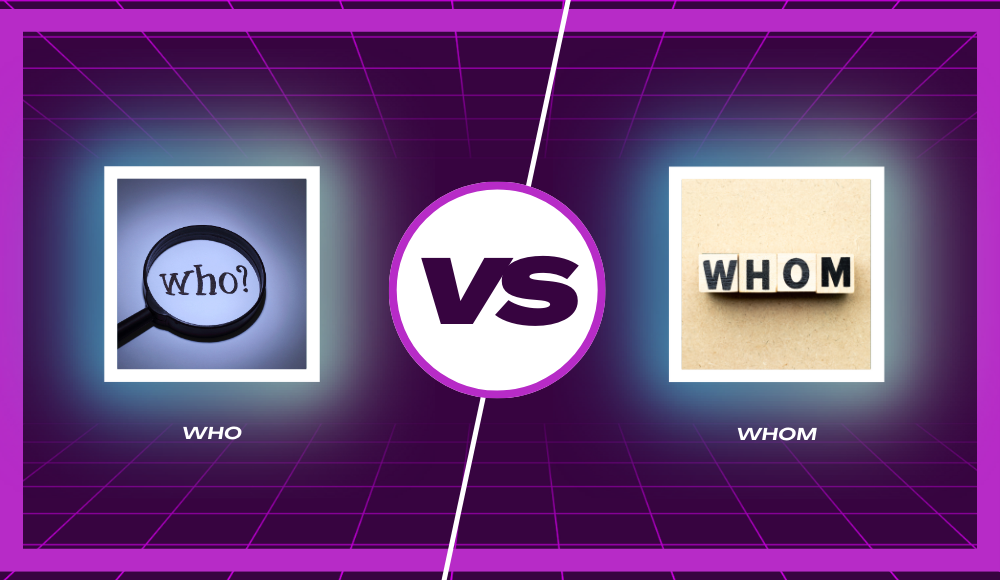Understanding the difference between “who” and “whom” can feel like cracking a secret code in English. These two pronouns are often mistaken for one another, but in reality, they serve different purposes in sentences. Our goal in exploring “who” vs. “whom” is to simplify their usage and give you practical insights that go beyond grammar rules, making them more relatable and easier to understand as a language learner.
Don’t let grammar trip you up! Unravel the mysteries of “whom” vs. “who” in English with clear examples and practical tips in this comprehensive guide. Grammar enthusiasts, language lovers, and anyone striving for precision in English writing welcome to a journey where we demystify the intricate world of “whom” vs. “who.” We’ve all been there—staring at a sentence, wondering which of these words fits perfectly. Fear not, for we’re about to make these grammar conundrums a thing of the past.
Whom vs. Who: Understanding the Basics
Before we attack headfirst into the maze of examples and usage rules, let’s establish a solid foundation. What exactly are “whom” and “who,” and when do they make their grand entrances in our sentences?
“Whom” is like the understudy, waiting in the wings, ready to step onto the grammatical stage when it’s time to refer to the object of a sentence or clause. On the other hand, “who” enjoys the spotlight as it refers to the subject of a sentence or clause. It’s a bit like casting actors in a play—the right word needs to match the role.
When to Use “Who” in English
Imagine you’re hosting an awards ceremony. “Who” gets the award for best performance when you’re referring to the subject—the superstar on the stage. Use “who” in these situations:
- Identifying Individuals: “Who is the new employee?”
- Questions About Actions: “Who wrote this captivating novel?”
- Subject of the Sentence: “The detective who solved the case received accolades.”
When to Use “Whom” in English
Now, let’s take a stroll down the red carpet and appreciate the times when “whom” deserves the spotlight for its performance as an object. Use “whom” in these scenarios:
- Referring to Individuals Objectively: “Whom did you invite to the party?”
- Questions About the Object of an Action: “To whom should I address this letter?”
- Object of the Sentence: “The award went to the actor whom the director praised.”
Getting to Know “Who” and “Whom”
Before we dive into real-life examples, let’s acquaint ourselves with the basic definitions:
- “Who”: The friendly subject pronoun, denoting the one acting.
- “Whom”: The object pronoun, highlighting the one receiving the action.
5 Whom vs Who Examples
| Sentence | Correct Pronoun | Explanation |
|---|---|---|
| 1. Who do you think will win the game? | “Who” | In this question, “who” serves as the subject pronoun because it refers to the one who will win (the subject) the game. |
| 2. To whom should I address this letter? | “Whom” | “Whom” functions as the object pronoun here, representing the recipient of the letter, which is the object of the preposition “to.” |
| 3. She is the one who/whom I admire most. | Both “who” and “whom” are correct. | In this sentence, “who” and “whom” can be used interchangeably because they can represent the object of admiration. |
| 4. Who is responsible for the project’s success? | “Who” | “Who” is the correct choice as it refers to the one responsible (the subject) for the project’s success. |
| 5. Whom should I invite to the party? | “Whom” | Here, “whom” is the object pronoun, representing the people you should invite, making it the object of the verb “invite.” |

Real-life examples of who and whom
To grasp these concepts better, let’s paint a picture with real-life sentence examples:
- Who: “Who ate the last piece of cake?” (Subject)
- Whom: “To whom should I address the invitation?” (Object)
- Who: “She’s the one who aced the test.” (Subject)
- Whom: “Whom did you see at the museum?” (Object)
These examples showcase the contrast between “whom” and “who” in action, helping you understand which word plays the leading role in different contexts.
Tips for Choosing Between “Whom” and “Who”
Making the right choice between “whom” and “who” doesn’t have to be an agonizing decision. Here are some practical tips to guide you:
- Simplify the Sentence: If you’re unsure, try simplifying the sentence. Replace “who” or “whom” with “he” or “him” and see which sounds correct. Example: “Who/Whom should I invite?” becomes “Should I invite him/him?” The answer is clear: “him,” so you should use “whom.”
- Master the Roles: Remember, “who” takes on the role of the subject, and “whom” steps into the shoes of the object. Keep this casting in mind.
Common Mistakes to Avoid
Let’s face it; even grammar enthusiasts stumble now and then. Here are some common pitfalls related to “whom” and “who” to steer clear of:
- Overusing “Whom”: While it’s essential to grasp when to use “whom,” don’t go overboard. In casual conversation, “who” is often acceptable.
- Ignoring Context: Always consider the context of your sentence. Sometimes, “who” may sound more natural even when “whom” is technically correct.
Practice Exercises of who vs whom
Learning by doing is a proven method. Here are a few exercises to hone your “whom vs. who” skills:
- Fill in the blanks with “who” or “whom” in the following sentences. a. ____________ did you meet at the park? b. The award goes to ____________?
- Rewrite the sentences, changing “who” to “whom” or vice versa to make them grammatically correct.
Practical Tips for Everyday Use
To make “who” and “whom” more approachable, consider these practical tips:
- Personal Pronoun Test: Replace the pronoun with personal pronouns like “he,” “she,” “him,” or “her.” If “he” or “she” fits, go with “who”; if “him” or “her” works, choose “whom.”
- Subject vs. Object: Determine whether the pronoun represents the doer (subject) or the receiver (object) of the action. Use “who” for subjects and “whom” for objects.
FAQs
Can “who” always replace “whom”?
While acceptable informally, “whom” is preferred in formal writing or when adhering to strict grammar rules.
What’s the cardinal rule for using “whom”?
If the word serves as the object of a verb or preposition, opt for “whom.”
Is “whom” falling out of favor?
It’s not obsolete but is being substituted with “who” in casual conversation and contemporary writing.
Can I always use “who” instead of “whom”?
While it’s acceptable in informal settings, using “whom” in formal writing or when addressing grammar purists is recommended.

